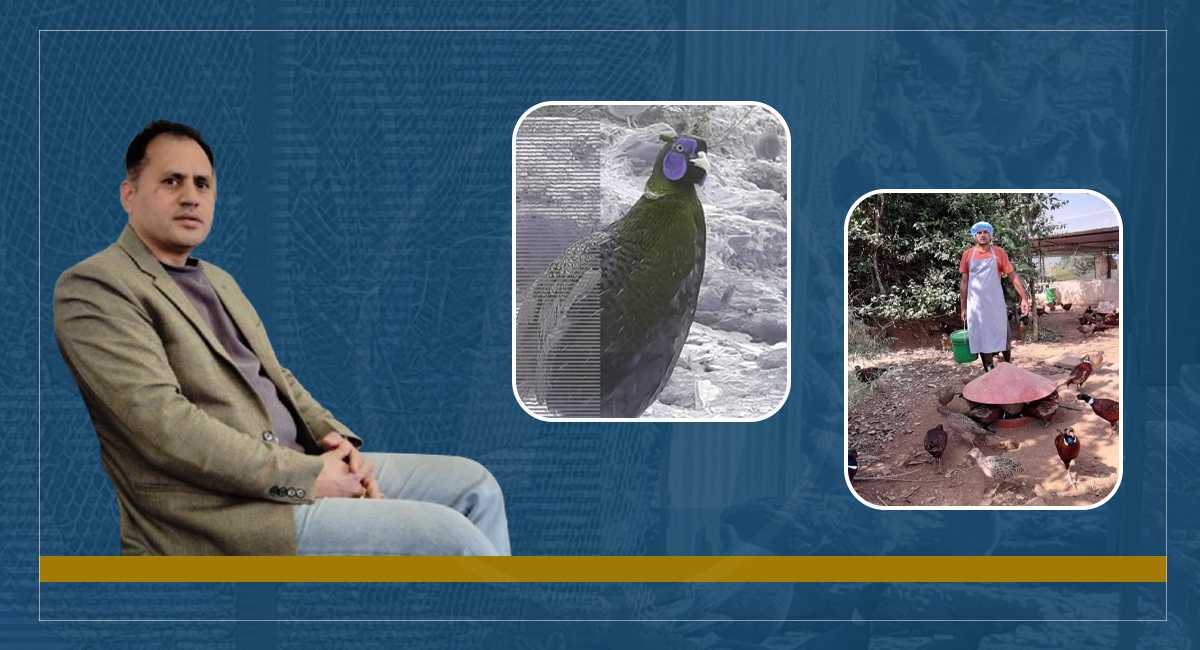KATHMANDU: “Drawing a picture of a horse and keeping a horse in a stable are two entirely different things,” a popular saying goes.
And yet, for those with unshakable optimism, who chase after every opportunity as if it’s their destined path, success often becomes an unrelenting pursuit, forever out of reach.
In the heart of Kathmandu, this paradox serves as a fitting backdrop to the journey of Bamdev Adhikari—a former student leader who traded politics for Kalij pheasant farming, embarking on a quest that challenges the very essence of success and failure.
Adhikari, a teenager from Dhading who had moved to Kathmandu with dreams of a better future, initially became involved in student politics with the belief that politics was a means to build the country.
He immersed himself in political movements, chanting slogans without ever mentioning the issues of hunger or thirst. He simply followed the orders of his leaders.
At the time, some believed that BP Koirala’s socialism was the solution to social transformation, while others championed Madan Bhandari’s democratic ideals or Marx and Lenin’s philosophies.
Under the influence of his environment, Bamdev chose BP’s vision.
Bamdev believes that the state needs to systematically encourage agricultural work. While there is a market for agricultural products, businesses should be supported in times of loss.
The atmosphere was charged with Maoist insurgency at its peak, and political parties were agitating against the king’s direct rule. In this climate, figures like Gagan Thapa and Bishwaprakash Sharma, Nepali Congress leaders, were the emerging leaders.
Bamdev considered it his destiny to follow in their footsteps.
However, as Bamdev grew more involved, he saw that those in power, who claimed to represent the people’s interests, were often driven by wealth and power.
He grew disillusioned with the political scene, realizing that many who opposed the king were equally motivated by the desire to become kings themselves.
After growing frustrated with the political games, Bamdev decided to take control of his own life. He turned to Kalij pheasant farming, a new and emerging field in Nepal.
Kalij Pheasant Farming: A New Venture
Bamdev chose Kalij pheasant farming because it was novel in Nepal. Having witnessed how agricultural ventures, initially fueled by passion, often turned chaotic, he came to believe that farmers in the country were the true Dalits.
No one acknowledged their struggles, no one offered support, and no one lent a shoulder. His desire to become a farmer grew as he realized the hardships of the agricultural community.
Though he had entered politics with a vision of social service, he remained connected to agriculture, striving for self-reliance.
People from his native Dhading could also consider farming and animal husbandry as a viable path.
However, for someone with a background in Sanskrit, business was a foreign concept.
Inspired by a desire for self-respect and the hope of gaining respect from others, Bamdev ultimately chose agriculture and became one of the early advocates of Kalij farming in Nepal.
The initial stages of the business looked promising. Kalij farming was new, and there was confidence that it would take off quickly.
The market was targeted at the elite class, who were willing to pay a premium for quality products.
With the vision of providing for this segment, Bamdev and his partner launched the business in 2075 BS with an investment of one crore rupees.
They secured a loan by putting up assets as collateral and constructed the physical infrastructure.
However, just as they began, the COVID-19 pandemic hit.
Challenges during the pandemic
The business had been set up with the aim of producing chicks, rather than meat. Special care and food were needed for the hens that hatched the chicks.
But when the lockdown in 2076 BS took effect, the business took a hit. The pandemic caused a decline across all industries, and agricultural businesses faced an even worse crisis.
Many entrepreneurs were displaced, and there was no state support during the crisis. Bamdev and his partner began settling their debts by venturing into other businesses.
At the time, there was no insurance for chicks, and the guidelines for such policies were still being formulated.
This delay in government action, combined with the collapse of many businesses, led to significant financial losses for Bamdev’s farm.
The potential of chick farming diminished, and the lack of transparency from the government worsened the situation.
The farce of agricultural subsidies
Bamdev criticized the misuse of agricultural subsidies. He observed that those with connections to the government, often not even involved in farming, were exploiting the resources intended for the farmers.
While the state had granted more power to provinces and municipalities, there was no direct subsidy from the central government.
With the powers granted to him through NARC, he intends to encourage the Ministry of Agriculture and Livestock Development to prioritize the welfare of farmers and give them hope for a prosperous future in their own land.
Though subsidies were supposed to support farmers and promote agricultural progress, Bamdev felt they were being misused.
Agriculture Minister Ramnath Adhikari had initiated efforts to address this issue, and the ministry had formed a committee to study it.
Bamdev hoped the truth would emerge about whether subsidies were being used effectively or misused by those with political connections.
The Plight of Farmers
Bamdev believes that the state needs to systematically encourage agricultural work. While there is a market for agricultural products, businesses should be supported in times of loss.
He points out that Nepal’s origins are deeply rooted in agriculture, and the country is blessed with a suitable climate and soil for farming.
However, young people are not being instilled with the belief that they can succeed in agriculture in Nepal.
Most people working in agriculture are disheartened. There is no reliable market, and the market that exists is controlled by mafias.
Farmers are often forced to sell their products at unfair prices. Bamdev laments that agriculture has become the most exploited sector in Nepal, with the political system contributing little to the resolution of these issues.
Bamdev’s Role in NARC
Recently, the government appointed Bamdev as a member of the Board of Directors of the Nepal Agricultural Research Council (NARC).
Over the past six years, he has closely observed the struggles of farmers, and now, with his new position, he is determined to advocate for policies that protect and support them.
Bamdev aims to create an environment where farmers can pursue their work without fear of exploitation.
Although he was not successful, he distanced himself from student politics soon after and shifted his focus to agriculture and teaching.
With the powers granted to him through NARC, he intends to encourage the Ministry of Agriculture and Livestock Development to prioritize the welfare of farmers and give them hope for a prosperous future in their own land.
Apart from his role at NARC, Bamdev also teaches at Padmakanya College.
He hopes to apply the vision of leaders like Arjun to the commercial expansion of agriculture, believing that, much like a wound that is healed through fire, the wounds of agriculture can be healed through active and effective agricultural practices.
Politics: A part of the journey
Bamdev joined the Nepali Congress’ student wing, the Nepal Students’ Union, because he believed in democratic ideals.
He studied at Valmiki Campus, Nepal Law Campus, and Tribhuvan University Central Campus, becoming an active member of the Student Union in 2055 BS.
He served as a member of the district working committee and later ran for joint general secretary in the 2074 BS Student Union convention.
Although he was not successful, he distanced himself from student politics soon after and shifted his focus to agriculture and teaching.









Comment